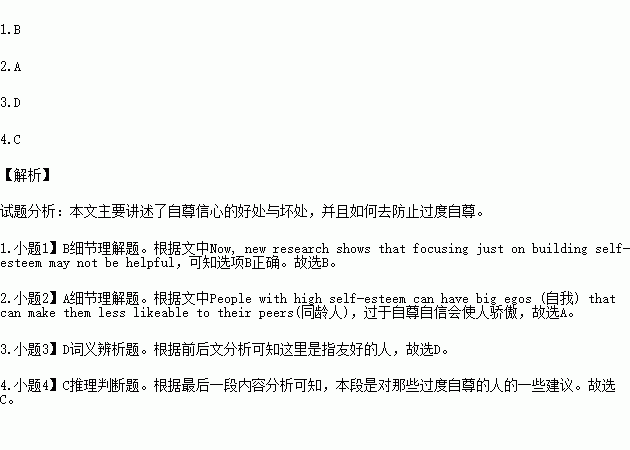题目内容
Everyone has good days and bad days.
Sometimes, you feel as if you’re on top of the world. But occasionally you feel horrible, and you lose things and you cannot focus on your schoolwork.
For more than 20 years, scientists have suggested that high self-esteem (自尊) is the key to success. Now, new research shows that focusing just on building self-esteem may not be helpful. In some cases, having high self-esteem can bring bad results if it makes you less likeable or more upset when you fail at something.
“Forget about self-esteem,” says Jennifer Crocker, a psychologist (心理学家) at the University of Michigan, US. “It’s not the important thing.”
Feeling good
Crocker’s advice may sound a bit strange because it is good to feel good about yourself.
Studies show that people with high self-esteem are less likely to be depressed, anxious, shy, or lonely than those with low self-esteem.
But, after reviewing about 18,000 studies on self-esteem, Roy Baumeister, a psychologist at Florida State University, has found that building up your self-esteem will not necessarily make you a better person.
He believes that violent and wicked (邪恶的) people often have the highest self-esteem of all. He also said: “There’s no evidence that kids with high self-esteem do better in school.”
Problems
All types of people have problems. People with high self-esteem can have big egos (自我) that can make them less likeable to their peers(同龄人), said Kathleen Vohs, a psychology professor at Columbia University.
People with high self-esteem tend to think more of themselves, Vohs says. People with low self-esteem are more likely to rely on their friends when they need help.
What to do
Researchers say it is best to listen to and support other people. Find positive ways to contribute to society. If you fail at something, try to learn from the experience. “The best therapy (药方) is to recognize your faults,” Vohs says. “It’s OK to say, ‘I’m not so good at that,’ and then move on.”
1.The new research comes to the conclusion that high self-esteem ________.
A. is not important at all
B. may not be the key to success
C. has taken on a different meaning
D. does not help you do better at school
2.One of the conclusions of the new research is that ________.
A. people with high esteem tend to be proud
B. people with high esteem usually do not seek other’s help
C. feeling good about oneself doesn’t mean you lead a happier life
D. people with low esteem are often more popular
3.The underlined part “a better person” in the passage probably means a person who is ______.
A. helpful and supportive B. gentle and modest
C. likable and successful D. friendly and kind
4.From the text, we can infer the best therapy mentioned in the last paragraph is mainly for people ________.
A. of all kinds
B. with low self-esteem
C. with high self-estee
D. who are focusing on building self-esteem
 文敬图书课时先锋系列答案
文敬图书课时先锋系列答案
